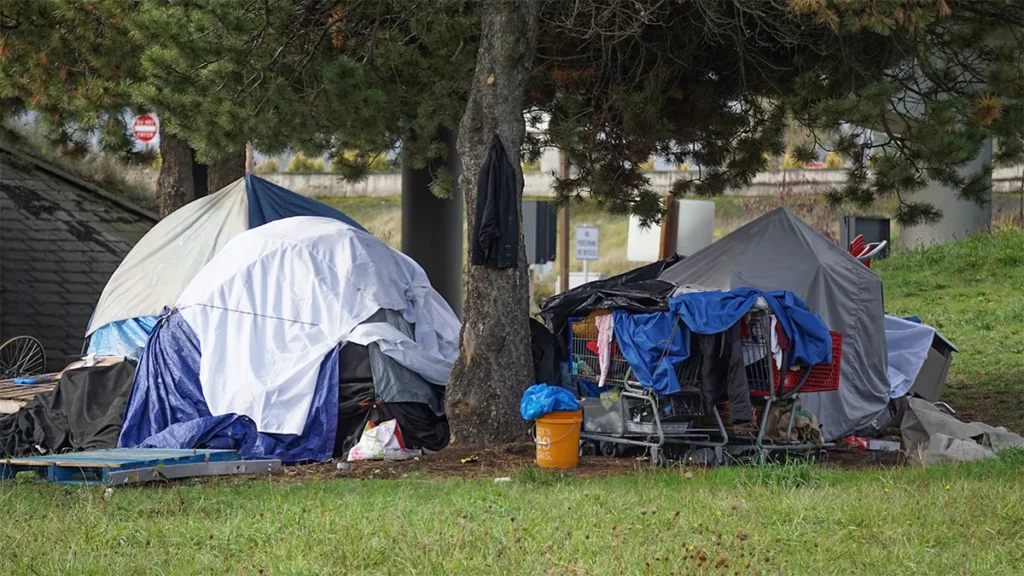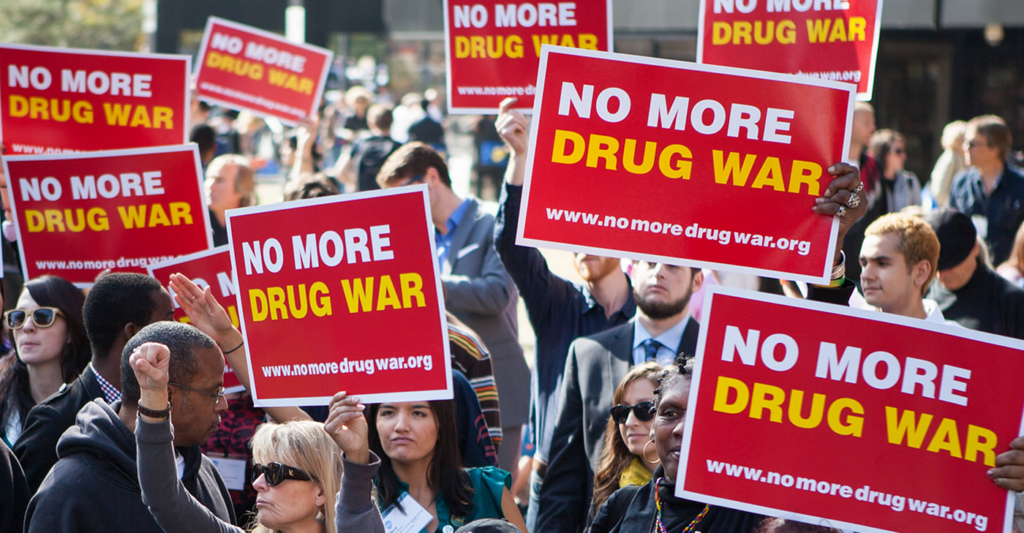In 2020, Oregon drug policy made headlines by decriminalizing the possession of small amounts of certain drugs, aiming to prioritize rehabilitation over incarceration.
Now, just a few years later, there’s a growing call to reverse course and recriminalize these substances.
This article delves into the complexities of the Oregon drug policy, the reasons behind this potential shift, and its implications for society, public health, and the justice system.

Understanding Oregon Drug Policy Measure 110
Oregon has a law called Measure 110, or the Drug Addiction Treatment and Recovery Act.
Voters approved it in November 2020 as a state statute.
The primary objective of Measure 110 is to decriminalize most unlawful possession of controlled substances (PCS) offenses.1
Under this law, individuals caught with small amounts of drugs will not face criminal charges.
Instead, they will be given a health assessment and offered treatment and recovery services to help them overcome drug addiction.
The aim of Measure 110 is to shift the focus from punishment to providing individuals with the necessary support and resources to tackle drug dependency.
House Bill 2645: A Loophole in Measure 110
Introduced in the 2023 regular session of the Oregon Legislative Assembly, House Bill 2645 seeks to heighten the penalties for possessing specific quantities of fentanyl, a potent synthetic opioid.2
This legislation imposes a misdemeanor penalty for fentanyl possession, outlining distinct unit measurements for determining offenses.
In contrast to Measure 110, which aimed to decriminalize minor amounts of drugs, including fentanyl, House Bill 2645 fills a gap by making possessing particular volumes of fentanyl illegal.
The enactment of this bill underlines Oregon’s endeavor to combat the public health crisis created by fentanyl, which has led to a surge in overdose fatalities.
It epitomizes Oregon’s dedication to harmonizing the objectives of decriminalization with the urgency of addressing the severe implications tied to the possession and consumption of certain dangerous substances.
The Proposal: Recriminalizing Hard Drugs
Oregon is currently facing a pivotal decision surrounding its drug policy.
While Measure 110 decriminalized the possession of small amounts of hard drugs, a new proposal seeks to revert this by recriminalizing drug possession, classifying it as a misdemeanor, and mandating treatment for those with drug dependencies.3
Proponents believe this step is crucial to combat rising drug-related challenges, viewing criminal penalties as a possible deterrent and emphasizing the role of obligatory treatment.
Conversely, critics argue that such a move could undo the gains achieved through decriminalization.
They advocate for harm reduction, emphasizing treatment and education over penal actions and cautioning against the disproportionate impacts on marginalized communities and the worsening of mass incarceration.
But data shows that decriminalization policies in Portugal have led to increased numbers of drug users, especially among younger populations as well as a host of other problems that Portugal has faced.
This debate, encompassing varied stakeholders, will shape Oregon’s future drug policy and its implications for its citizens and justice system.
It seems that decriminalization is leading to more problems, in the eyes of many.
Significance: In 2020, 58% of voters greenlit Measure 110, decriminalizing the possession of minor quantities of potent drugs and allocated cannabis tax revenues towards addiction therapies. A move towards re-criminalization could redefine addiction strategies and financial allocation for the foreseeable future—advocates of the law caution that its repeal might adversely affect individuals seeking to overcome drug addiction.

The Real, Visible, and Tangible Impacts of the Legislation
Oregon residents have reported the following impacts in a recent article by the Seattle Times4.
Increased visibility of open-air drug use in areas like downtown Portland.
Oregon’s overdose rates have continued to rise.
Growing tents of unhoused people in Portland; some attribute it partly to the policy.
There are long waiting lists for treatment, with some people calling for the measure to be replaced with stricter fentanyl possession laws.
Officer David Baer of the Portland Police frequently issues Measure 110 citations and administers Narcan for overdoses.
Arguments in Favor of Recriminalization
Proponents of recriminalizing hard drugs attribute the rising rates of addiction, overdoses, and associated crimes to the leniency in current drug policies.
They contend that reinstating criminal penalties for drug possession can serve as a strong deterrent, discouraging potential users from experimenting or developing dependencies on hard drugs.
This, they believe, could stem the tide of drug-related challenges on social, health, and economic fronts.
On the contrary, critics emphasize the effectiveness of harm-reduction strategies and treatment-based approaches.
They advocate for addressing the root causes of drug use and championing policies rooted in public health and individual welfare, underscoring the multifaceted nature of the drug policy debate.
Counterarguments Against Recriminalization
The Ongoing Debate

The current discourse engages diverse stakeholders, including experts, policymakers, and community members, offering unique insights on various topics.
Experts provide evidence-based arguments derived from research, data, and practical experience, aiming to enlighten and influence policy decisions.
Policymakers, influenced by factors like political ideologies and public sentiment, navigate the intricacies of the issues, making decisions with far-reaching societal consequences.
On the other hand, community members’ real-world experiences offer valuable perspectives that other stakeholders might overlook.
Analyzing these myriad viewpoints is vital to grasp the subject thoroughly.
This diverse engagement fosters critical thinking and innovation, paving the way for balanced policies that address societal challenges while considering various interests.
Implications and Potential Outcomes
Research and data are pivotal in understanding the implications of decriminalizing drug-related offenses.
Proponents believe reintroducing criminal penalties could deter drug use and trafficking, potentially reducing drug-related crimes.
They argue that the fear of legal repercussions might discourage participation in drug-related activities and offer avenues for those struggling with addiction to seek treatment through the criminal justice system.
However, critics highlight the historical trend where punitive measures led to increased incarceration without genuinely addressing addiction’s root causes.
They emphasize that such strategies often disproportionately affect marginalized communities and exacerbate social inequalities.
Beyond the direct effect on crime rates, the broader societal implications of recriminalization must also be considered.
While supporters see it as an avenue for individuals to seek recovery, opponents stress the importance of harm reduction and treatment-based methods.
They believe recriminalization could obstruct individuals’ access to essential healthcare services and substance abuse treatment.
Relying heavily on punitive measures, as opposed to prevention, education, and rehabilitation, might strain the criminal justice system further.
This multi-faceted issue demands a well-informed and evidence-based approach to balance crime reduction, public health, and support for those battling addiction.
Additional Considerations
The ongoing nature of the debate emphasizes the need for informed decision-making.
The politicized nature of decision-making can be a barrier to evidence-informed choices, highlighting the importance of considering a range of relevant evidence.
Informed decision-making requires understanding the complexities and potential consequences involved and recognizing that it is an ongoing process that should evolve based on new information and insights.
By prioritizing evidence and engaging in open and inclusive deliberation, decision-makers can make more informed choices that effectively address the challenges.
___
If you or a loved one is struggling with addiction, please don’t hesitate to ask for help.
At Cornerstone Healing Center in Scottsdale, AZ, we specialize in holistic healing practices to address addiction.
Let us be a part of your recovery journey!



